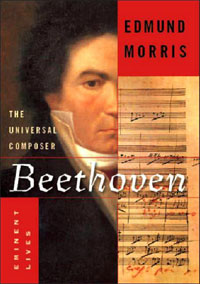Book Notes
 Edmund Morris, Beethoven; The Universal Composer (NY: Harper Collins, 2005), 243pp.
Edmund Morris, Beethoven; The Universal Composer (NY: Harper Collins, 2005), 243pp.
This slender volume is no substitute for the likes of Maynard Solomon's 500-page Beethoven (1977, revised in 1998), but that is not its purpose. Rather, this "Eminent Lives" series publishes biographies on "canonical figures" by distinguished contemporary authors. Edmund Morris, for example, is best known for his Pulitzer Prize-winning biography The Rise of Theodore Roosevelt (1979) and, more recently, Theodore Rex (2002), although I notice that the book jacket also describes him as a pianist and "private scholar of music" who has "studied Beethoven for a half century." The result is an accessible book geared for a general readership about one of the greatest composers ever to live.
Compared to Mozart who astonished regal courts at age six or seven, Beethoven (1770–1827) got a comparatively late start, although by his teenage years he was an acknowledged genius. The first written comparison to Mozart is when Beethoven was thirteen. He was also well-known for his multitude of eccentricities—his ugly looks, poor social skills, inability to perform simple math, slovenly personal habits and squalid living conditions despite his wealth, deep loneliness, a volcanic temper, depression, unimaginably manipulative and vindictive behavior towards those closest to him, greed, lying and cheating, and, of course, his deafness that descended upon him at the age of thirty-one. After meeting together four times in the summer of 1812, Goethe described Beethoven as "an utterly untamed personality."
But his music, so full of "contrast and conflict," is simply some of the most beautiful and sublime ever to emerge from a mortal. With quick strokes Morris takes us through Beethoven's aborted lessons with Mozart (he returned after two weeks for his mother's funeral), and then his move at the age of twenty-two to study with Haydn in Vienna, where he lived for the rest of his life. At the ripe age of twenty-four he had what amounted to his public debut, after which history took its course. His final public performance was in 1814, a dozen years before he died.
Beethoven's ambition and prodigious capacity for work made him a wealthy celebrity and the darling of both royalty and aristocracy. But he was hounded his entire life by deep loneliness, chronic ill health, and social alienation due to his eccentricities. But by himself he instigated a revolution in music: "The age of Affekt, of familiar sounds in rationalized patterns designed to evoke specific emotions, was over. The age Argument had begun: music that actually fought with itself, with the composer struggling to balance its contrary dynamics, and the performer struggling to master its difficulties—while the listener, caught up in the struggle, too, wondered which force was going to prevail" (145).


